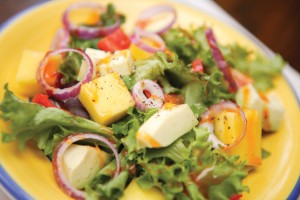Embe – A taste of Africa and the Caribbean
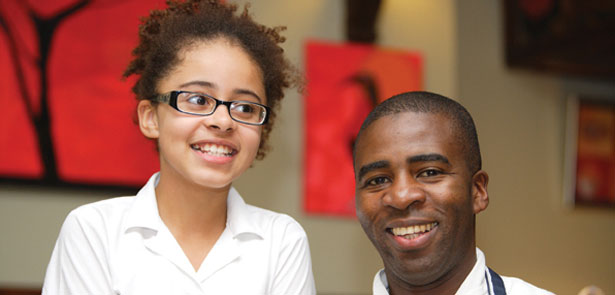
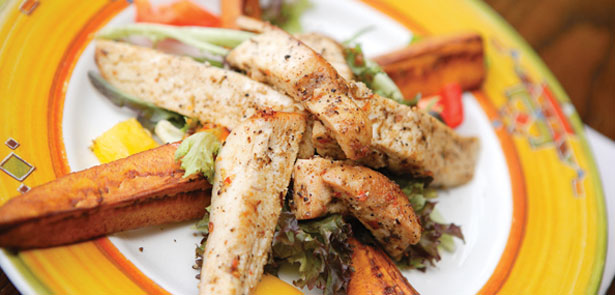
There can be few more exotic dining experiences in Peterborough than what’s on offer at Embe Restaurant where Tanzanian Nick Rutta serves up a true taste of Africa and the West Indies. Stuart Barker spoke to the owner and chef of Peterborough’s only Afro-Caribbean restaurant
I learned from my mother’s cooking
Nick Rutta says, explaining his passion for food.
In my country you get taught to cook at a very young age because you need to be able to cook for yourself as soon as you move out of home. In Tanzania, both girls and boys are taught to cook but that’s not the case in all African countries. In some places they would think “What, men cooking? No way!” but in Tanzania it’s normal.
Nick’s mother clearly taught him well, and now, 25 years after leaving his native Tanzania, Nick is serving up her traditional family recipes, passed down for generations, in the heart of Peterborough, a world away from their country of origin.
Embe Restaurant offers a refreshing change from the Indian and Chinese cuisine that has become a staple of our high streets. It serves up an exotic mix of African and Caribbean dishes, using unusual ingredients like cassava (a tropical root vegetable) and christophene (also known as a vegetable pear, it belongs to the cucumber and squash family). ‘There’s a lot of sweet potato and cassava used in Caribbean and African cooking’ Nick says. ‘You can’t grow it in this country – it only grows in tropical countries – but it’s possible to find it in markets, either in Peterborough, Leicester or London. A lot of the ingredients for Caribbean food can be picked up quite easily now in England.’
While everyone’s familiar with a chicken tikka masala or sweet and sour pork, the staples of Caribbean cuisine are less well-known. The key, according to Rutta, is the careful and inventive use of spices to complement the food rather than to overwhelm it. ‘Caribbean food uses quite a lot of spices but they’re not hot, burning spices. We do sometimes use Scotch Bonnet chillies but the way we use them just gives a nice flavour to the food, it doesn’t blow your brains out! We use spices to enhance the flavour of the food rather than using them just for heat. And we use only natural ingredients so there’s no food colouring or anything unnatural added – we even use mangoes for sweetness instead of sugar.’
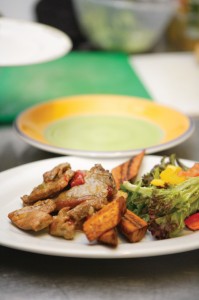 And what goes for Caribbean cuisine usually holds good for African food too. ‘People tend to think there’s a big difference between the two but there isn’t’ Nick says. ‘The only difference is maybe in the way that the food is cooked. For example, in Tanzania they use a lot of sweet potato and they use a lot of that in the Caribbean too. It’s a very versatile vegetable so you can fry it or grill it or boil it and different people just prefer it different ways. In Nigeria, they like to mash their yams whereas in Tanzania, we prefer to cook yams more like potato chips. So a lot of the dishes I serve are Tanzanian but I picked up a lot of things from other countries in Africa too and have added bits of those.’
And what goes for Caribbean cuisine usually holds good for African food too. ‘People tend to think there’s a big difference between the two but there isn’t’ Nick says. ‘The only difference is maybe in the way that the food is cooked. For example, in Tanzania they use a lot of sweet potato and they use a lot of that in the Caribbean too. It’s a very versatile vegetable so you can fry it or grill it or boil it and different people just prefer it different ways. In Nigeria, they like to mash their yams whereas in Tanzania, we prefer to cook yams more like potato chips. So a lot of the dishes I serve are Tanzanian but I picked up a lot of things from other countries in Africa too and have added bits of those.’
So what sort of dish would Rutta recommend for a newcomer to his native cuisine?
I’d probably go for something like Jerk Chicken. It’s marinated for a few hours and I then cook it in a sauce with Scotch Bonnet chillies and tomatoes and garlic and quite a lot of spices like cumin. You could eat that with rice or a sweet potato salad or just with a side salad.
Incredibly, Rutta not only owns and runs Embe Restaurant, he also does all the cooking so you know that every meal you order there is prepared by the man himself. ‘It’s very tough’ he admits. ‘I have to concentrate heavily on the kitchen to make sure the food comes out great but you also have to make sure it’s served in the way that people expect. Most of my time is spent cooking – from Tuesdays to Sundays – but I close on Mondays to give me a chance to catch up on all the paperwork and family stuff. I work more than 100 hours a week so it’s quite demanding. My wife helps me as much as she can but she has her own job, and obviously I have front-of-house staff, but I think it’s important that people know who’s cooking the food; it means there’s a real level of consistency.
Rutta describes his menu as ‘home-style food, but with a twist to make it more interesting.’ Yet despite the exotic and healthy nature of the cuisine, Afro-Caribbean restaurants remain few and far between in the UK. It’s a fact that Rutta is hard-pressed to explain. ‘I think people tend to associate this kind of food more with takeaways than with restaurants so it will take time to change those perceptions. I mean, you get a few Afro-Caribbean restaurants in London and other big cities but I think it will be a long time before they became as popular as Indian and Chinese restaurants. But because we are the only place serving this sort of food in the area, we get customers visiting us from quite far away; people travel from Cambridge and even further to dine with us.’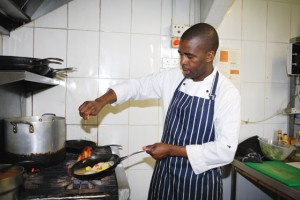
But Afro-Caribbean food may be about to emerge from the shadows thanks to people like Levi Roots doing their bit to promote this style of food. The celebrity chef and musician came to the nation’s attention when he took his Reggae Reggae sauces onto Dragon’s Den and soon had them stocked in mainstream supermarkets. ‘Levi has really helped to promote Afro-Caribbean food’ Rutter says. ‘You see his sauces everywhere in supermarkets and that’s made people more aware of this kind of food – it lets them know that there’s more than Chinese and Indian food if they want to taste something different.’
At Embe, you can hear something different too as Rutter hosts Afro-Caribbean bands on occasion, though not as often as he would like. ‘It’s quite hard to get hold of bands with Caribbean and African themes but we do get some coming up from London occasionally. There’s no local bands doing that sort of thing. It’s very popular when we do get a band though – we sold out last time and there were more people wanting to get in!’
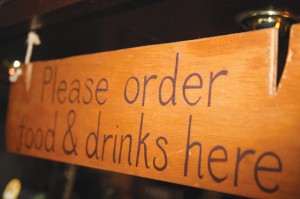 Under normal circumstances, Embe restaurant can cater for up to 55 people so it’s advisable to book, especially for Friday and Saturday nights. In fact, business has become so brisk that Rutta is planning to change the way he operates his menu to ensure customers still get the freshest of food but without undue waiting time. ‘I’m planning to change the menu so we will offer three starters, three main courses, and three desserts at a time, and we’ll change those dishes every week. The more dishes we offer at one time, the longer people have to wait because everything is prepared from fresh. So it makes sense to offer less dishes and just vary the menu more regularly. That way, people can also sample many more dishes if they dine with us regularly.
Under normal circumstances, Embe restaurant can cater for up to 55 people so it’s advisable to book, especially for Friday and Saturday nights. In fact, business has become so brisk that Rutta is planning to change the way he operates his menu to ensure customers still get the freshest of food but without undue waiting time. ‘I’m planning to change the menu so we will offer three starters, three main courses, and three desserts at a time, and we’ll change those dishes every week. The more dishes we offer at one time, the longer people have to wait because everything is prepared from fresh. So it makes sense to offer less dishes and just vary the menu more regularly. That way, people can also sample many more dishes if they dine with us regularly.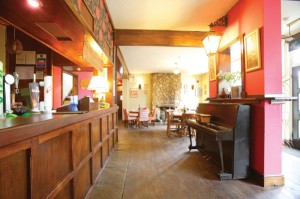
‘But being my own chef is a good thing because it means I have complete quality control! And because I do all the cooking, we can also cater for people with different needs, so if you don’t eat wheat or if you’re vegetarian then it’s no problem. My wife is vegetarian anyway so we offer lots of vegetarian options. And because everything is prepared fresh on the premises, we can always take off something that a customer doesn’t want, so every dish can be tailor-made to suit your tastes.’
What’s in a Name?
In Tanzania we speak Swahili and Embe is the Swahili word for mango. I like the mango because you can use it in so many different ways. It’s a very versatile fruit and I think that reflects the nature of our restaurant very well.
Embe Restaurant
2 Burghley Road, Peterborough, Cambs, PE1 2QB
Tel: 01733-873003



